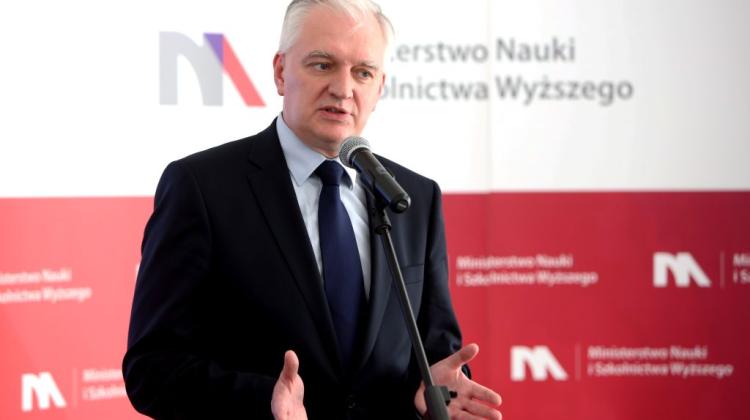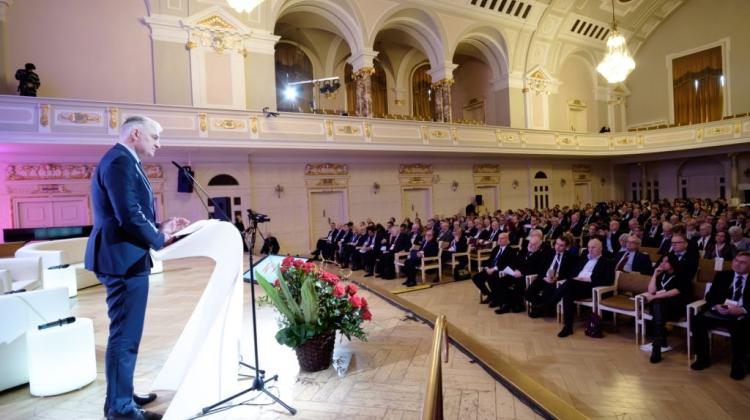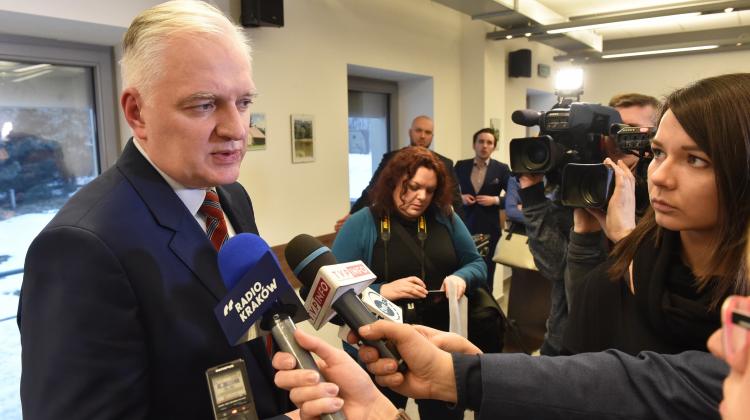Gowin: Fourth Industrial Revolution is a chance for developmental leap

For Poland, the Fourth Industrial Revolution it is an opportunity for a developmental leap - said in an interview with PAP Deputy Prime Minister, Minister of Science Jarosław Gowin. As the driving forces behind this revolution he mentioned, for example, universal access to the Internet and data, and mobile devices.
PAP: Ministry of Science is involved in the Impact congress, which will take place on 15 and 16 June in Kraków. The theme of this congress will to be the Fourth Industrial Revolution. The first industrial revolution is associated with the end of the eighteenth century and the age of steam. The second industrial revolution is the beginning of the twentieth century and electricity becoming commonplace, and the third - the 1970s, dawn of the age of computers. What do you consider to be the industrial revolution number four?
Deputy Prime Minister, Minister of Science and Higher Education Jarosław Gowin: There is no simple answer. There are a few components of this revolution. Firstly, universal access to the Internet, and secondly - significantly lower the cost of data storage, thirdly - mobility of devices, fourthly - renewable energy sources, and fifthly - artificial intelligence.
An example of this revolution in practice is the fact that in 1990 the top three US companies from Detroit had a market capitalization of 36 billion dollars, and in 2014, which is just a quarter century later, the three leading companies in Silicon Valley had a market capitalization of more than a trillion dollars while maintaining ten times smaller employment. This illustrates well the scale of the changes that the fourth industrial revolution introduces.
PAP: will the fourth industrial revolution affect the Polish society, entrepreneurs, scientists?
J.G.: I think that the functioning of the Polish economy needs to change fundamentally. From the position of the country, which was an efficient assembly plant that offered competent, but low-paid workers, we have to make a transition to the phase in which thousands of the most talented young scientists will be able to start companies that will compete with the entire world in the field of modern technologies.
Deputy Prime Minister Mateusz Morawiecki proposed a plan to make Poland one of the world leaders when it comes to electric vehicles. But there is a number of other examples, such as 3D printing or drones. As for the production of drones, on one hand we have modern companies using the achievements of Polish scientists, on the other hand we have a market of orders for military purposes. And public procurement can be a driving force of new technologies.
For Poland, the Fourth Industrial Revolution it is an opportunity for a developmental leap. Just like in the 1990s we leaped over the check payment system and jumped straight in the era of card payments, today in many areas of modern technology we can skip the earlier phase.
PAP: So you think that the fourth industrial revolution can not be avoided, we only need to use the opportunities it offers?
J.G.: In the conditions of global economy, all countries will be a part of this revolution. The question is whether we will be one of the locomotives or a car stuck somewhere far behind. It seems to me that the plan of Deputy Prime Minister Morawiecki and my actions - concerning science, universities, research institutes and funds from the National Centre for Research and Development - give Poland a chance to become one of the leaders in Europe when it comes to this revolution.
PAP: And how exactly does the Ministry of Science intend to join the fourth industrial revolution?
J.G.: Firstly, the competitions of the National Centre for Research and Development will be closely integrated into the plan for responsible development, the Morawiecki plan. We will finance research projects in those areas that according to the Ministry of Development have the greatest potential - this means modern technologies. Secondly, we want to create a new academic career path - strictly implementation-based. And finally, the third area is the reform of research institutes. They must review their priorities - they should write integrate their activities into the responsible development plan.
PAP: Does that mean that when it comes to implementation-based career path, an amendment to the law is planned?
J.G.: Yes, we are planning an amendment to the Law on Scientific Degrees and Titles. This concept includes not only the opening a new academic career, but its incorporation into the activities of companies. We rely on the model, which the Danes have been successfully using for decades. After the summer holidays we will start a public consultation on the bill.
PAP: Back to the Impact conference - how will it differ from other conferences of this type?
J.G.: It will be the first serious attempt of the Polish scientists, industrialists, politicians to confront the challenges posed by the fourth industrial revolution. We want Impact in Kraków to be an annual, periodic event. We want it to bring together representatives of companies operating in the field of modern technologies, as well as scholars.
PAP: What is the intended result of the congress?
J.G.: Creating a conceptual base for the implementation of the Polish modernization program. The era of hot water is behind us. Now it\'s time for a decisive leap into the world of the fourth industrial revolution.
Interview by Ludwika Tomala
***
The congress Impact\'16, one of the largest conferences on the economy in Poland, will be held on June 15-16 in Kraków. Its theme will be the Fourth Industrial Revolution and resulting global technological, social and economic changes. Impact\'16 will bring together representatives of industry, entrepreneurs and startups, researchers, venture capitalists, as well as representatives of incubators, science and technology parks, the government and local governments.
PAP - Science and Scholarship in Poland
lt/ agt/ mrt/
tr. RL
Przed dodaniem komentarza prosimy o zapoznanie z Regulaminem forum serwisu Nauka w Polsce.


















